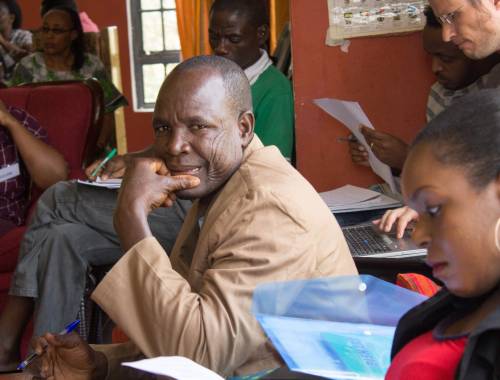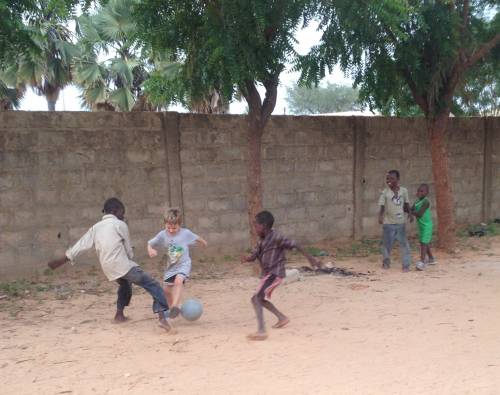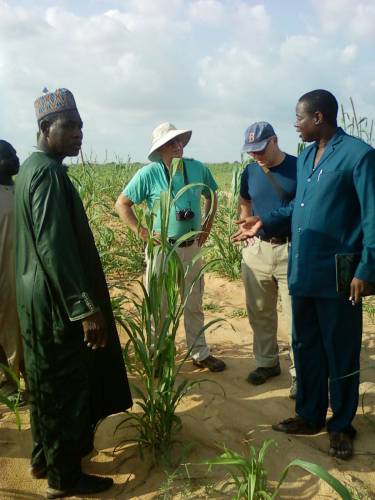A letter from Michael and Rachel Ludwig, serving in Niger
November 2017
Write to Michael Ludwig
Write to Rachel Ludwig
Individuals: Give online to E200513 for Michael and Rachel Ludwig’s sending and support
Congregations: Give to D507575 for Michael and Rachel Ludwig’s sending and support
Churches are asked to send donations through your congregation’s normal receiving site (this is usually your presbytery).
“God is on the move in the Niger!”
It was exciting to hear this message from Issaka, our supervisor from our partner church, the Evangelical Church in the Republic of Niger (EERN). As we met in the national office on a bright, fresh morning at the end of the rainy season, we were full of encouragement as we heard his enthusiasm for what the church has already accomplished by the grace of God. Looking at the last three years that our family has been with the church in Niger, he was quick to highlight our small contributions as some of the key elements that have helped the church act on their vision so much better now than in recent memory. While we know their successes are mostly to do with the work of the Holy Spirit and the talents and hard work of the new national leadership that began just before we arrived, it still brings us joy to recognize the blessings in which we’ve shared a part. As we look back at this year specifically, we can see how the ministry we’re called to, being a bridge for the Body of Christ in Niger, has made progress in each of the three main elements of our work.

Pastor Issa loved interacting with our CHE internship group, and even practiced skin-to-skin contact with his newborn baby girl in October!
Bridging Community Health Evangelism (CHE)
“No, that would never happen in my culture!” was the response of Pastor Issa. The issue was the vast benefits of skin-to-skin contact for a newborn baby, even from its father. This type of phrase was often repeated by Michael’s Nigerien co-worker with a big smile as our group of largely Africans sat together and learned CHE lessons regarding women’s cycle of life, and men’s and women’s roles in families. But by the end of each discussion among our mature, Christian, fellow participants in the CHE internship program, he had processed his objections and was excited to put these ideas to use in his own cultural situation. This chance to be immersed in CHE thinking and practices at a deep level was one of the biggest blessings of the CHE internship that Michael recently completed with Issa, the CHE National Trainer for the EERN. The content and method of CHE lessons is so rich with helpful information, but much of it comes across as so unexpected the first time it is bridged into a different culture. Pastor Issa, whom Michael has been helping train and prepare for his role this year, is a key beginning to this bridging process. From family and women’s issues, to healthy household practices and adding value to local products, he has developed a CHE way of thinking as he sees what is possible.
As Pastor Issa integrates his heightened understanding into the CHE training we give in Niger, the bridge gets shorter to help evangelists practice this method. But these CHE ideas have already impacted the evangelism and outreach approach of our partners through the trainings we completed this year. In the spring, we held a training for 25 evangelists from the region of Dosso, and we’re mentoring four of these who will serve as examples of how to implement the method in individual communities. We’ve seen positive steps in each community, from villagers cleaning out their wells to non-Christians meeting to discuss Bible stories. This year, Pastor Issa and Michael have also been teaching 30 students at one of the Bible schools the core principles of CHE. Helping these students think about how they can affect their communities through living out their health and evangelism training is also an important part of bridging this strategy to places across their nation.

Our children playing soccer with some neighborhood kids as they build more relationships.
Bridging into Local Culture
“Oh, your children hear (understand) Hausa,” is what our neighbors are starting to say about our children, instead of the opposite! We couldn’t be doing the bridging of CHE if we weren’t also actively engaged in bridging friendship, care, and faith into the place we live in Niger. Much of this bridging starts with our efforts in learning the Hausa language, which is starting to feel more natural. In fact, this year feels like a success from the progress we’ve had in the language and culture field. We’ve been able to start translating some for visitors and understanding discussions in Hausa, and Michael even preached a whole sermon in Hausa (which was joyously received). Our relationships are growing stronger, starting with the neighborhood kids who clearly appreciate how we play with and pay attention to them. But we’ve also seen the same genuine appreciation from the leaders of our partner church and many neighbors. In some of these relationships, we get to share audio Bibles. In others, we simply share things like internet access. From the teenage student who’s learning to lead the call to prayer at the closest mosque to the older man and his family who are longstanding leaders in the neighborhood, we’ve all continued to develop stronger relationships that are based on willingness to be open to another person’s world and interests.

Our partner church supervisor, Issaka (right), showing a field of millet to new friends from the US.
Bridging Back to the US
“I had to come back to see it to believe that they could grow anything in a place like this.” That’s what one of our new friends from Virginia said on his second trip to visit the church in Niger, this time in the rainy season. Bridging CHE and bridging friendship and faith in Niger also enables us do our other important work of bridging these understandings, encouragements, and relationships back to US Presbyterians. This August, two new friends came from a US church to get to know their brothers and sisters in the EERN better and learn about the problems of farming here. During the time we helped host and build a relationship with these US Presbyterians, we got to learn a lot more about the problems of agriculture here and what part we can play in helping the Bible schools in this area. This is a great example of the synergy that happens in the communities of mission practice that PC(USA) World Mission is trying to foster. Communities of mission practice are the communities that form around God’s mission in certain places, which work and strengthen when local Christians, mission co-workers, and mission supporters are all involved in common work toward the same goals as led by the Spirit.
You all are an integral part of this synergy and of the community of mission practice for Niger. We want to thank you for your support and the interest you’ve taken in us and in partnering with the EERN. Without your prayers, financial support, and efforts in learning and engaging, we can agree with Issaka that there would have been a lot less encouragement in the work here this year. We pray that God will encourage you to continue to participate in this community of mission practice in Niger! And may God continue to use our partners in the EERN to bring about transformation and the understanding of the good news we have in Jesus Christ.
Michael and Rachel Ludwig
![]() You may freely reuse and distribute this article in its entirety for non-commercial purposes in any medium. Please include author attribution, photography credits, and a link to the original article. This work is licensed under a Creative Commons Attribution-NonCommercial-NoDeratives 4.0 International License.
You may freely reuse and distribute this article in its entirety for non-commercial purposes in any medium. Please include author attribution, photography credits, and a link to the original article. This work is licensed under a Creative Commons Attribution-NonCommercial-NoDeratives 4.0 International License.